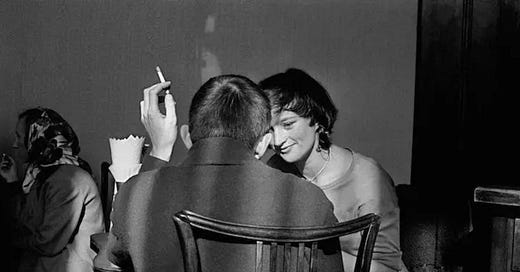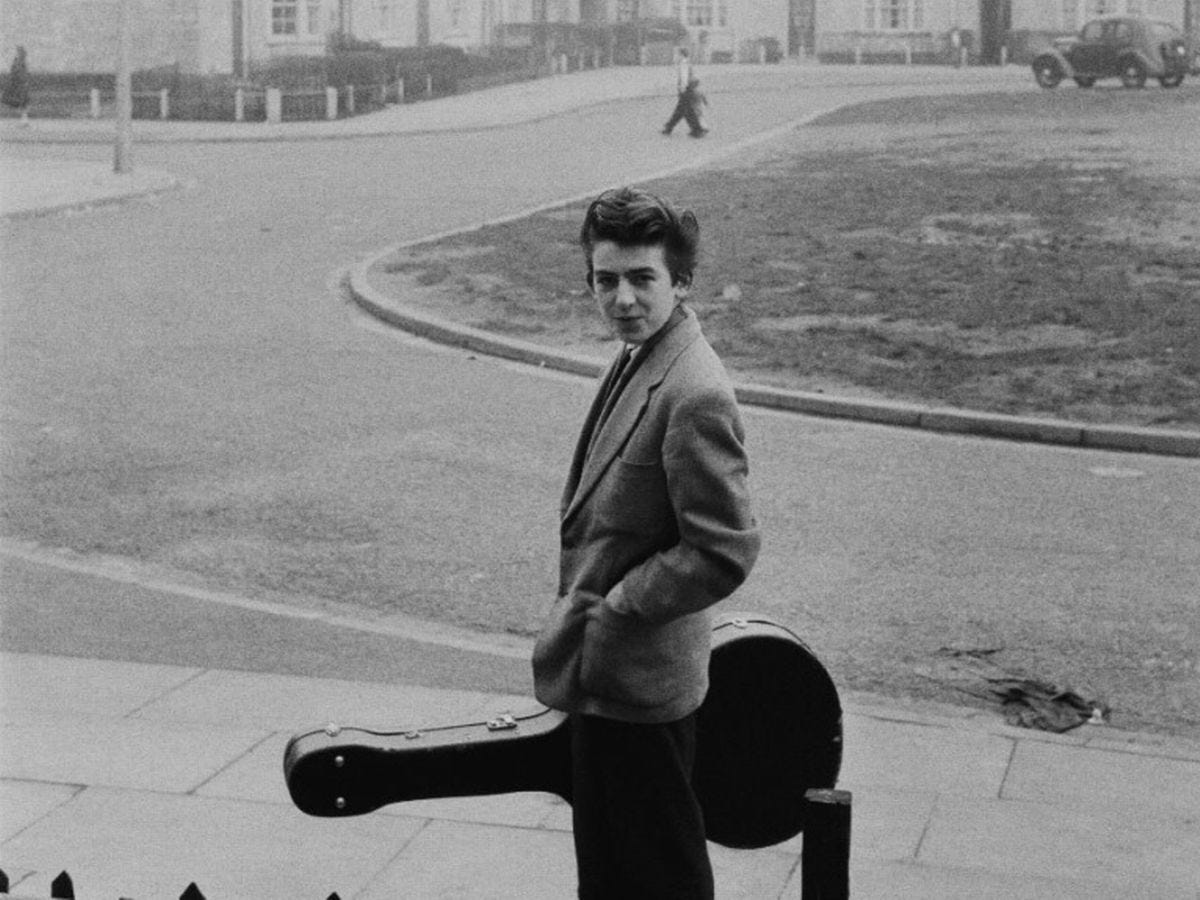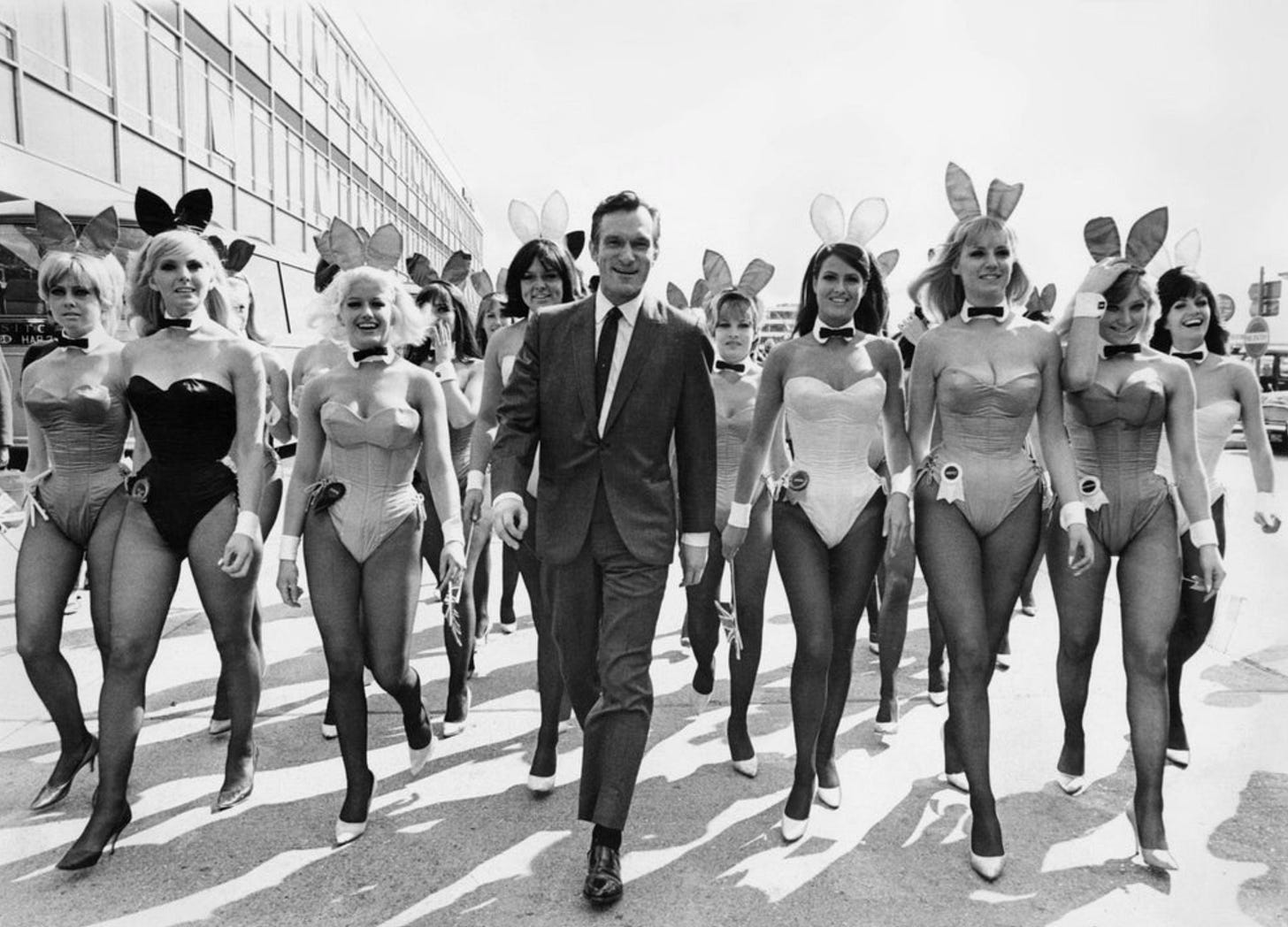Hippie Hippie Hoorah
The rebellions of the 1960's prompt us to ask: what does it mean to be punk rock?
No. 141: Hippie Hippie Hoorah
I’m curious, and for once not about some abstract and artistic concept, but a concrete and historical one.
What in the world was the 1960’s?
As a youngin, it was pretty easy to give the 60’s an easy pass as cool and hip. But taking a closer look, this was likely the naive abstraction of a probable idiot (me).
So I ask again…
Were the reforms of the 1960’s impactful ones? Was the sexual revolution a net positive? Do the 1960’s deserve the exalted position they’ve earned in the consciousness of most Americans, especially young ones?
More and more, I venture to respond… No.
The cars were rad, the music groovy, the vibes unequivocally far out. On the artistic and military front, rock on, brother—the ideological reforms of the 1960’s were, as far as I can tell, positive. They introduced new and interesting influences on creative culture and leveled existential questions at America’s militaristic endeavors.
But on the social front, I wonder if the tenants of punk rock and progressivism seeded in the muddy soil of the 1960’s are, in fact, what they purport to be.
Were the rebels were ever truly rebels in the sense that their mission spanned beyond self interest? It seems possible that the ideological descendants of the hippies are instead the best adherents to the status quo. For if the great humanism promised by these movements was the apparent end, where is it?
Let’s start with a logical aperitif.
Which is more punk rock? More radical? More rebellious?
A) The woman who chooses not to use birth control
B) The woman who chooses to use birth control
or, to turn to the male side of things…
A) The man who commits himself to one woman
B) The man who follows his weiner into the bedrooms of many women
You can see where this is going.
On closer inspection, it seems reasonable to doubt whether the various reforms of the 1960’s were anything approximating to what they so nobly claimed to be. For one, what other revolutions can we point to that have been carried out as smoothly as those of the 1960’s, with little to no meaningful resistance on the part of The Man? From this POV, the 1960’s begins to look a lot more like the pursuit of individual hedonistic desire, the intended or unintended effect being the implosion of group consciousness in America—which, ironically, is that unit of society best poised to resist a pushy government. If this is so, the true loser was not The Man, but families, communities, and groups. The true winner was the individual. The prize, instant gratification. And if this isn’t fundamentally American, what is?
If strength in numbers is a truism, the division and every-man-for-himself mindset advanced during the 1960’s increased our collective helplessness, it seems. If in the beginning government leaders were a bit nervous about this wave of kids with a noble list of demands for a better way of life, their fears were quickly allayed when the revolutionaries deemed mission accomplished with a handful of shrooms and readily-available orgasms. Realizing there was nothing to fear, the government not only said, Let the kids fuck! They also apparently said, Let the kids get fucked! as drugs proliferated and programs like MKUltra were kicked off by the Central Intelligence Agency to explore how psychedelic drugs could be used to weaken and even brainwash the citizenry.
So far, things are not looking great for this particular revolution.
The story of the 1960’s makes sense, too, accounting for the apparent lack of struggle beyond the presumed internal turmoil inherent in shirking the responsibilities involved in being a selfless person. Perhaps this was, in some way, warranted. The 1950’s and the decades before surely contributed to a rising tension within the spirits of young Americans. The society was too repressive, orderly, and narrow, the sons and daughters of World War II era parents would say.
But it seems worthwhile to pause when “revolution” is invoked for what was, essentially, an every-man-for-himself movement. I can think of no other revolution in history that so obviously concerned itself with the individual rather than the whole. It’s reasonable to think the freedom fighters of the 1960’s believed the movement would benefit whole, but that idea seems to have mostly flopped. In the sense that people became open to new ways of exploring their identities, lifestyles, and unique creativity? The 1960’s were a win. But in the obvious destruction of the individual—and thus the group—through wholesale drug addition, overdose, alcohol abuse, bad parenting, etc., there were clearly a number of catastrophic losses that we’re still dealing with today.
Enter the aptly named sexual revolution, its central tenants being…
Sex is first and foremost a recreational activity
Contraception is cool and encouraged and liberating
Feminism
Being single is better than getting married
Even before addressing the sour fruits of these tenants, they are clearly contrary to human nature, which is a hardly promising start. And again, let us briefly lament the apparent paradox of these ideas being posed as revolutionary, rebellious, or punk rock when they materialize as the opposite: aligned to the benefit of the government and the opinion of popular culture; materialist; anti-humanist; unhealthy; and anti-collectivist.
For a movement hailing the liberation of the woman, it’s women that seem to get most obviously robbed. No big-brained psychoanalyst is needed to recognize the above principles benefit men while leaving the women in a tough spot—all while diabolically telling her she’s never been more quintessentially free.
For example, how many women, as a result of the sexual revolution, started taking pharmaceutical birth control pills (a win for men) instead of rejecting them (punk rock)? How many began to ignore the power of their bodies and indiscriminately have sex (a win for men) instead of choosing men with some intention of sticking around should they become pregnant (punk rock)? How many had children with men who felt no obligation to be a father—and, in fact, did leave—because being single is modern (a win for men), getting married is lame (a win for men), and sex is recreational (a win for men)? How many are squandering their true desire to start a family (punk rock) and are instead spending their prime years drinking, sleeping with questionable men, taking medications, buying stuff as consolation, and being lonely? How many women have aborted unborn children with the logic that sex is recreational instead of choosing to give birth to a human despite the challenges (punk rock)?
The answer to all of these is certainly a lot. I can say, from my experience as a 29-year-old young man, this is the current state of affairs—which is why it seems worthwhile in the first place to put down these words. The sexual revolution removed whatever remaining incentives were place for men to, you know, be a good guy, placing the focus instead on immediate sexual gratification, individuality, and material wealth over relationships. Is this a win?
The effects can be seen on the mens’ side of things, too.
How many men are staying single or maintaining a long-term girlfriend because they are afraid to get married, have kids, and care for a family (punk rock)? How many struggle to find a woman that actually wants those things (punk rock), rather merely dating, working, and pleasure-seeking? How many men, having no family or familial aspirations, are at loss for purpose beyond their career and the accumulation of wealth? How many men are beating their meat three times per day while watching PornHub instead of seeking an actual life companion?
We could go on, but we won’t.
Instead, we might simply ask: What does it mean when a society is suddenly made up of men and women such as these, rather than people living in groups and families and according to the obvious intention of nature? How does the look, feel, and quality of life differ in a country where the populace is made up of individuals focused on themselves vs. families focused on the good of each other?
In my estimation, the result is a society and culture precisely opposite to the punk rock philosophy I so admire, and that I think many associate with the 1960’s. Today, we worship our jobs and possessions and, most of all, our individuality, even when it’s precisely these that are making us feel utterly empty. We look to the government for moral guidance and follow religiously whatever’s deemed correct, put into their bodies whatever slop or medications are deemed standard, and so remain at the mercy of our old friend, The Man, because to entertain the thought of submitting ourselves to a partner, our kids, our health, or a God—instead of tailor-made Spirituality—would put us outside of the tenants of individual liberation a.k.a. that which we hold more sacred than all else.
On the flip side, we can imagine a world in which the revolutions of the 1960’s are not entirely thrown out, but responded to with rationality, humanity, and that true spirit of punk rock rebelliousness. It may sound contradictory (isn’t that the point?), but with each passing day it seems to me the religious in the United States tend to be the greatest punk rockers of all, holding themselves not to governmental or cultural mandates but to ideas they deem truer and better. They’re also good for it. They live it out. They don’t say one thing and do another. And finally, they are often ridiculed for it, which is maybe the most punk rock of all.
For a sample of this punk rock nature, we might sum up with a few choice excerpts from a document called Humanae Vitae (“Of Human Life”), an encyclical letter issued by il Papa (the Pope of the Catholic Church) in—let the record show—1968.
Acknowledging arguments such as the rapid rise of the human population and the “new understanding of the dignity of woman and her place in society, [...] the value of conjugal love in marriage, and [...] man's stupendous progress in the domination and rational organization of the forces of nature to the point that he is endeavoring to extend this control over every aspect of his own life—over his body, over his mind and emotions, over his social life, and even over the laws that regulate the transmission of life,” the letter is essentially—how should I say?—the Church’s thoughts on having sex, making babies, or just getting down for the fun of it. And on a serious note, it’s positively beautiful:
[Married] love is above all fully human, a compound of sense and spirit. It is not, then, merely a question of natural instinct or emotional drive. It is [...] an act of the free will, whose trust is such that it is meant not only to survive the joys and sorrows of daily life, but also to grow, so that husband and wife become in a way one heart and one soul, and together attain their human fulfillment.
It is a love which is total—that very special form of personal friendship in which husband and wife generously share everything, allowing no unreasonable exceptions and not thinking solely of their own convenience. Whoever really loves his partner loves not only for what he receives, but loves that partner for the partner's own sake, content to be able to enrich the other with the gift of himself.
Finally, this love is fecund. It is not confined wholly to the loving interchange of husband and wife; it also contrives to go beyond this to bring new life into being.
The fundamental nature of the marriage act, while uniting husband and wife in the closest intimacy, also renders them capable of generating new life—and this as a result of laws written into the actual nature of man and of woman. And if each of these essential qualities, the unitive and the procreative, is preserved, the use of marriage fully retains its sense of true mutual love and its ordination to the supreme responsibility of parenthood to which man is called.
And on natural birth control…
[The Church] considers it lawful for married people to take advantage of the infertile period but condemns as always unlawful the use of means which directly prevent conception. In the former the married couple rightly use a faculty provided them by nature. In the later they obstruct the natural development of the generative process. It cannot be denied that in each case the married couple [are] perfectly clear in their intention to avoid children and wish to make sure that none will result. But [...] in the former case husband and wife are ready to abstain from intercourse during the fertile period [...] and when the infertile period recurs, they use their married intimacy to express their mutual love and safeguard their fidelity toward one another. In doing this they certainly give proof of a true and authentic love.
And on the difficulty of this ideology and the inevitable attempts of culture and government to dismiss it…
[It] is true that like all good things which are outstanding for their nobility and for the benefits which they confer on men, so this law demands from individual men and women, from families and from human society, a resolute purpose and great endurance.
To you [Public Authorities and Rulers of Nations] is committed the responsibility of safeguarding the common good. You can contribute so much to the preservation of morals. We beg of you, never allow the morals of your peoples to be undermined. The family is the primary unit in the state; do not tolerate any legislation which would introduce into the family those practices which are opposed to the natural law of God. For there are other ways by which a government can and should solve the population problem—[...] by enacting laws which will assist families [and educate] people wisely so that the moral law and the freedom of the citizens are both safeguarded.
No statement of the problem and no solution [...] is acceptable which does violence to man's essential dignity; those who propose such solutions base them on an utterly materialistic conception of man himself and his life. The only possible solution to this question is one which envisages the social and economic progress both of individuals and of the whole of human society, and which respects and promotes true human values.
To me, it’s ideas like these that are truly revolutionary, and truly punk rock.
Have a thought? Respectful commentary and discussion is emphatically encouraged.








Food for thought is not a grand enough expression to encompass the argument(s) you put forward here Matt. This is the deepest exploration of our current society and the roots of our pervasive mindsets that I've read, probably since my college years. A serious and unexpected look at how we've arrived at where we are. It's going to take me awhile to really digest all this and will certainly require a rereading. The most serious and challenging piece of writing of yours that I have read. I am a bit in awe of it. Bravo